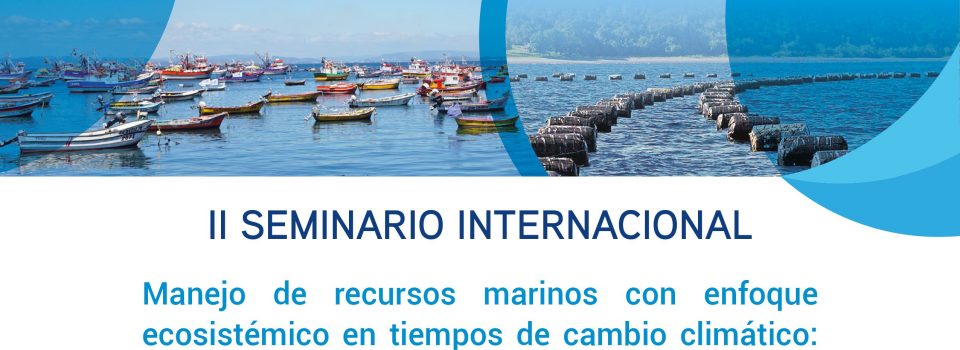II International Seminar on Marine Resources Management with an Ecosystemic Approach in Times of Climatic Change: Progress, Challenges and Actions.
October 30th, 2024Between November 12th and 14th, the Second International Seminar on Marine Resources Management with an Ecosystemic Approach in Climatic Change Times will be held: Progress, Challenges and Actions. It is organized by Fisheries Development Institute (IFOP), and the Marine Sciences Chilean Society (SCHCM), and will take place in the Honor Hall of Pontificia Universidad Catolica de Valparaíso (PUCV) within the framework of IFOP.’s 60th Anniversary Commemoration .
Let us remember that ecosystemic approach is key: it not only seeks to conserve or increase an ecosystemic capacity to produce benefits in the future, but also works to fairly distribute these benefits and costs among society.
Marine resources are vital for economy, food and ecological balance of our planet. However, in a climatic change scenario, these resources face unprecedented challenges. Rising temperatures, ocean acidification and rising sea levels are directly affecting marine ecosystems and the species that depend on them.
Ecosystemic management plays a fundamental role in facing climatic change, as it focuses on conservation and sustainable use of natural resources in the context of entire ecosystems. In the case of marine resources, ecosystemic management provides a comprehensive approach to addressing the impacts of climate change.
In this context, marine resources sustainable management is undergoing a paradigm shift, slowly evolving from mono-specific management to Management with an Ecosystemic Approach (MEE). In effect, it is being considered to apply MEE within the objectives of management of activities associated with fishing and crop resources to achieve sustainable activities, which provide sources of food, jobs, socioeconomic yields and a good state of the environment. .
Currently this concept has not been easy to understand or put into practice both in ecological, environmental, social and even political spheres. Due to this, it is necessary to build discussion spaces where it is shown how and implement MEE effectively for aquatic resources management. This proposed discussion space that is to be built is particularly relevant and timely when considering the deteriorating state of many fisheries and farming systems, growing evidence of the impacts of climatic change, and the oceans pollution. The discussion about how to implement the MEE is not trivial, given the multiplicity of visions that exist in this regard and the need to define and propose clear and timely public policies. However, scientific and technological advances that have had great development in recent years must be taken advantage of, allowing the monitoring of marine and fishing systems to be improved and thereby obtaining a better approximation of the state of the ecosystems.
For its part, the South Pacific Permanent Commission (CPPS) has carried out actions to incorporate MEE through associations with United Nations Food and Agriculture Organization (FAO) and research centers that have led the issue. at regional level. Highlights include workshop “Ecosystemic Approach in Fisheries as an Instrument to Support Decision-Making Process, Phase I” (Lima, Peru, June 12-14, 2018) and the workshop “Ecosystemic Approach in Fisheries as an Instrument to Support Decision-Making Process.” Decision Making, Phase II” (Santiago, Chile, June 18-20, 2019). While Chile has organized, among others, the “International Seminar on Management of aquatic resources with an ecosystemic approach: progress, gaps and perspectives” (December 1-3/2020): Following this same line, this year 2024, will carry out the II International Seminar on marine resource management with an ecosystemic approach in times of climatic change: Advances, challenges and actions, in Valparaíso city, between November 12th and 14th, 2024, which includes keynote talks from different areas that encompass MEE. Additionally, spaces for discussion will be opened for the implementation of this management in Chile’s marine resources management .
Press realted links:
